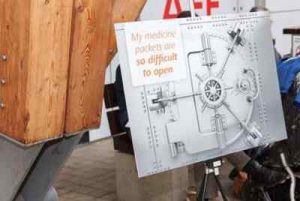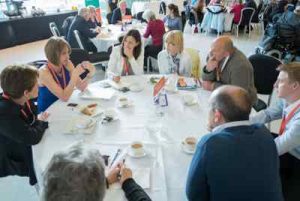Patients share views to help clinicians, researchers and industry develop new products to improve patients’ lives
PATIENTS living with long-term conditions such as kidney disease and stroke have told researchers, clinicians, charities and industry partners what it is like to live with their condition and how it can have an impact on their quality of life, dignity and independence.

During a patient-led event, organised by the NIHR Devices for Dignity Healthcare Technology Co-operative (D4D HTC), patients highlighted the realities of living with disabilities and illnesses on a long-term basis. These included everyday problems such as feeling isolated and a reduced ability to perform simple everyday tasks, from eating and drinking difficulties to struggling to open medications or get around.
The event gave patients the opportunity to tell the NHS and industry what their healthcare product priorities should be. The information will be used to help shape future plans for new technologies that can improve patients’ lives. D4D is one of eight specialist Health Technology Centres making positive healthcare changes in partnership with industry. D4D specialises in empowering people with long-term conditions and disabilities to live more dignified and independent lives through the development of new healthcare products and technologies. It is hosted by Sheffield Teaching Hospitals NHS Foundation Trust.
Dr Nicola Heron, Programme Director for D4D, said: “This was the first time we’ve held an event like this, and it was great to see almost 100 members of the public, health organisations, charities and industry come together to look at ways in which we can creatively come up with technological-based solutions that could really make.
David Coyle, Renal Patient Lead with D4D, was instrumental in making this event happen, alongside patient advocate and stroke survivor Kate Allatt. David, a survivor of kidney failure, kidney transplant, cancer, and lung disease, said: “When we think about long-term conditions we tend to think about the initial impact on people’s lives, but what’s not often spoken about is how people manage day in, day out with conditions such as kidney disease, which often entail frequent trips to the hospital for treatment and considerable adjustments to everyday routines that lead people feeling vulnerable and no longer themselves.”

Stories shared at the event included that of Sheffield-born Kate Allatt, a mother-of-three who ’awoke in her own coffin’ after suffering a stroke which left her with locked-in syndrome. The terrifying condition left her unable to move any part of her body. Although she was considered unconscious, she wasn’t, and felt stripped of all her dignity and ‘trapped inside her body’. During the event Kate started the discussions around devices by introducing some ideas that could have helped her when she was at her most vulnerable, such as a device to help her control painful bladder spasms, and a communication board where she could select ‘End of word’ whilst spelling words out.
My Dignity Means: A Patient-led Event took place in Sheffield on 2 June 2015.

